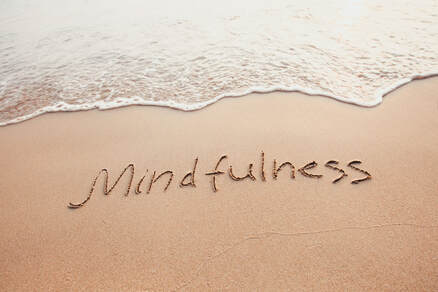Mindfulness: During The Pandemic and BeyondWritten by Lindsay Tobin, PsyD, LCP Although we find ourselves in the new year, 2021, not much seems to have changed. A lot of us are still working remotely and many children are still learning virtually. Many times these events are happening in the same home with multiple family members all day. The weight of the Coronavirus pandemic and its consequences have followed us into this new year. How can we enact change in our lives when so much is the same? Oftentimes we look for our outside environment to change in order to trigger changes in us, our behaviors, our relationships, our moods, our goals, etc. Thus many people are feeling stuck right now. Stuck in anxiety and low mood, stuck in the ruts of old habits and poor communication. What can change? What agency do we have?
In the practice of mindfulness we find answers to those questions. Mindfulness practice helps us relate differently to our thoughts and feelings. It allows us to remove ourselves from the constant frantic pace of the doing mode and move safely to the being mode where we can observe our thoughts and feelings with openness and curiosity rather than as problems needing to be solved. When we do this we can choose whether or not to respond (rather than reacting). We open up a universe of creativity when we are in the being mode, whereas doing mode narrowly focuses our attention on the perceived problem, leaving little room for creativity and big picture thinking. How does it work? By practicing mindfulness meditations daily you can improve your ability to be in the present moment (rather than ruminating about the past or anxiously anticipating the future). This changes how you relate to thoughts and feelings and thus your ability to communicate with others. Think about it, if you are talking with someone and half your mind is thinking about past issues you’ve had with this individual or anticipating what the best response/argument is to what the other is saying, you are not really in the moment with them, hearing what they are trying to convey. Daily mindfulness practice has been shown to improve mood, lower the risk of relapse to depression, reduce symptoms of anxiety and irritability, and improve sleep. Sounds easy, right? The practice of mindfulness is simple, but not easy. There are many resources for engaging in mindfulness meditations. Meditations are guided and run from 3 minutes to 40+ depending on the meditation and the desired focus. All it takes is setting aside the time to engage in the practices and listening. It sounds easy. It is not. Our brains actively resist the being mode. They have been trained over many years of formal education to value the doing mode (i.e. problem solving, critical thinking, etc). However, we were all born with the ability to be fully aware in the present moment. Just look at a baby discovering his or her hands and fingers, feet and toes. Both modes of being are useful and good. We presently have a great imbalance between the two which can lead to and/or contribute to low energy, low mood, high anxiety, feelings of burnout, sleep disturbance, depression, and other physical health concerns (i.e. cardiovascular issues and intensification of chronic pain). If you are interested in learning more about mindfulness practices, the best place to start is MBCT (Mindfulness-Based Cognitive Therapy). This is an evidence based practice that is used to help individuals manage all the symptoms mentioned above. But you do not have to suffer from depression or anxiety or chronic pain in order to benefit from MBCT or a daily practice of mindfulness. To learn more, I highly recommend Mindfulness: An 8-Week Plan for Finding Peace in a Frantic World (by Mark Williams and Danny Penman). This book comes in many formats and includes a link for guided meditation practice. It leads you through an 8-week plan of habit disruptors, mindfulness practices, and guided meditations. Mark Williams, one of the authors, is one of the founders of MBCT. If you would like more guidance, please contact me at OakHeart Center to schedule an appointment. If you are interested in learning Mindfulness Skills as part of a therapeutic experience, please call 630-570-0050 or email us at [email protected]. Comments are closed.
|
OakHeart
|
- Home
- Counseling
-
Specialties
- Depression
- Bipolar Disorder
- Anxiety Disorders >
- Obsessive-Compulsive Disorder (OCD)
- Eating Disorders
- Grief and Bereavement
- ADHD
- Maternal Mental Health
- Infertility, Miscarriage, and Neonatal Loss
- Domestic Violence and Sexual Assault
- Posttraumatic Stress Disorder (PTSD) >
- Trauma
- Non-Suicidal Self-Injury (NSSI)
- Substance Use Disorders (SUD)
- Anger Management
- Insomnia
- Divorce Recovery
- Relationship Concerns and Couples Counseling
- Self-Esteem
- Therapy for Therapists
- LGBTQA+ Support
- Faith-Based Counseling
-
Providers
- Erin Mitchell
- Pamela Heilman
- Katie Sheehan
- Hillary Gorin
- Lee Ann Heathcoat
- Adam Ginsburg
- Megan Noren
- Sarah Williams
- Christina Bieche
- Bridgette Koukos
- Laura Lahay
- Kate Nash
- Anna Perkowski
- Alma Lazaro
- Leah Arthur
- Marissa Vogrin
- Erin Blair
- Amy Jakobsen
- Lizzy Lowe
- Tony Fasano
- Gerry Lawm
- Vanessa Osmer
- Kat Harris
- Locations
- Contact
- Treatments
- Employment
- FAQ and Notices
- OakHeart Blog
- Administrative and Leadership Team
- Mental Health Resources
- Divorce Mediation
- Professional Consultation
|
|




